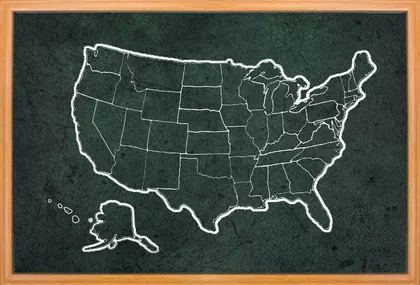If you are a dentist considering taking a continuing education course in Botox and dermal fillers, you may be wondering whether you are even allowed to do so under the laws of your state. We’ve done some of the legwork for you and summarized the laws of 27 states and categorized them from most to least restrictive. For a complete list visit our page: State by State Dental Botox Regulations (USA).
 Two states, Mississippi and Virginia, restrict the dental use of Botox to oral and maxillofacial surgeons, and it is only permitted after the surgeon has completed a specific residency.
Two states, Mississippi and Virginia, restrict the dental use of Botox to oral and maxillofacial surgeons, and it is only permitted after the surgeon has completed a specific residency.
A majority of states permit dentists to administer Botox and dermal fillers within the scope of dental practice. While the wording differs, the laws can be summed up as permitting the use of these products for treating conditions related to the mouth and jaw, but forbidding their use outside these areas. These states require that dentists who administer Botox do so only after completing an approved program of training and include: Alaska, Connecticut, Florida, Idaho, Iowa, Kansas, Maryland, Nevada, New Hampshire, New York, North Carolina, Texas, Washington, West Virginia and Wisconsin. The laws of a few of these states do not actually address the use of Botox specifically, but do specify that dentists are not allowed to treat patients for conditions outside the area of the mouth and jaw.
In Arkansas and Louisiana, dentists may administer Botox and dermal fillers with the only restriction being that they complete a course of training that includes coverage of certain topics, including: patient consultation and evaluation, contraindications, possible risks and side effects, how to manage adverse reactions, therapeutic and esthetic uses, and hands on practice with live patients. These two states limit dental use of Botox to dentists in their dental offices, and forbid support staff from administering the injections.
A few states currently have no regulations regarding use of Botox by dentists, though some are considering proposed regulations. These states include: Massachusetts, New Mexico, Pennsylvania, South Carolina, South Dakota, and Wyoming. While these states may not specifically require specific training, it is important to note that many malpractice insurance carriers do. Regardless, adequate training is important, whether or not it is actually required.
Delaware has taken an ambiguous stance on dentists administering Botox. Several have inquired into the issue, and The Board of Dentistry and Dental Hygiene in Delaware has responded by refusing to take a position. Currently, Delaware neither permits nor forbids the administration of Botox by dentists and treats any alleged violations regarding Botox on the facts presented on each case.
Keep in mind that state laws do change from time to time. If you have any doubt, be sure to verify that the law in your state hasn’t changed before seeking training.
To read more about Botox courses for Dentists, visit http://dentox.com/botox-edu-news/botox-courses-dentists/
